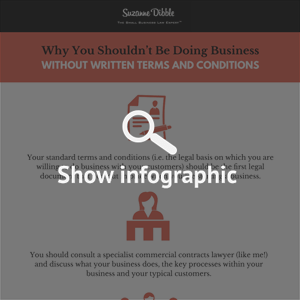
Your standard terms and conditions (i.e. the legal basis on which you are willing to do business with your customers) should be the first legal document that you put in place when you are starting a business. You should consult a specialist commercial contracts lawyer (like me!) and discuss what your business does, the key processes within your business and your typical customers. The lawyer will then draft you a robust set of standard terms that you will use for each future transaction, with you just stating the points particular to each customer (such as the exact services or goods and price) in the purchase order or in a schedule. You pay one upfront fee and use the terms and conditions again and again, safe in the knowledge that your business is properly protected. They are essential for any business for the following reasons:
1. written terms and conditions help to create certainty as to the agreement
Oral contracts are in theory just as enforceable as written contracts, but the main problems with oral contracts are evidence and certainty. You may forget some of the terms that have been agreed with the passage of time or there may be a dispute as to what was actually agreed.
Similarly, with emails back and forth, it can be difficult to work out what was actually agreed. It is much easier to have your standard terms and conditions to hand that have been drafted by a lawyer and clearly set out the position on all important matters. It will also cost you a lot more in legal fees if you have any dispute if a lawyer has to spend time reading through chains of emails to work out what the contractual position is rather than it already being drafted in plain English.
2. written terms and conditions help to minimise legal disputes and the chances of you being taken to court
If you do have clear written terms covering all of the necessary areas of your provision of goods or services, the chance of a legal dispute is minimised as a lawyer will advise the customer that the terms are clear on the matter and they would have little chance of winning if the matter were to go to court. Accordingly, you are less likely to be taken to court.
3. written terms and conditions help you to cover all of the important matters and not overlook the things that are less obvious
As a non-lawyer, you will probably consider the more business related terms such as price, payment terms and delivery costs, but you may not think about limiting your liability, disclaiming your liability for failure or delay caused by force majeure, protection of your intellectual property rights and the passing of title and risk. A well drafted set of terms and conditions will fully protect your position.
4. written terms and conditions help you to enforce your agreement
If you have clear terms and conditions, it will be clear where a customer has breached the contract. Written contracts are much easier to enforce should you wish to take a customer to court (for example for non payment).
5. written terms and conditions help you to provide good customer service
A clear set of terms and conditions that are applied consistently to all customers can assist you with providing good customer service. With regard to the protections for you, it will not come as a surprise to the customer when you seek to enforce a right specified in the terms. But moreover, in addition to including protections for you as the supplier, you can also include rights for your customers in your terms to provide them with reassurance as to how you will handle the agreement, for example sections on complaints, refunds and insurance.
6. written terms and conditions help to avoid mismatched expectations
Mismatched expectations are not good for your business! For example, if you are supplying products, your customer may expect delivery within 2 days. You might actually require 2 weeks as you are importing the goods from overseas. If you spell this out clearly in your terms and conditions, you will have less disgruntled customers and save time on administration in answering calls from customers wondering where there products are.
If you are a supplier of services, a written contract is almost more important for this reason. If you are a website designer for example, it is always advisable to have as detailed a specification as possible so that there are no mismatched expectations as to timescales, layout, further charges etc.
7. written terms and conditions help you comply with the law
There may be certain regulations that apply to your particular industry that you would be wise to make reference to in your terms and conditions. If you are carrying on an e-commerce business, the law requires you to provide certain information to your customers in writing prior to conclusion of the contract and this is usually set out in written terms and conditions. The Provisions of Services Regulations that came into force in late 2009 require suppliers of services to provide the customer with certain information and the appropriate place for this is in the terms and conditions.
Email or call us now to discuss your standard terms of business and the protections that you need!
Data Breaches Happen. How Prepared is your Organization?
Download Suzanne Dibble's Customizable GDPR Compliance Pack to Protect Your Business!















